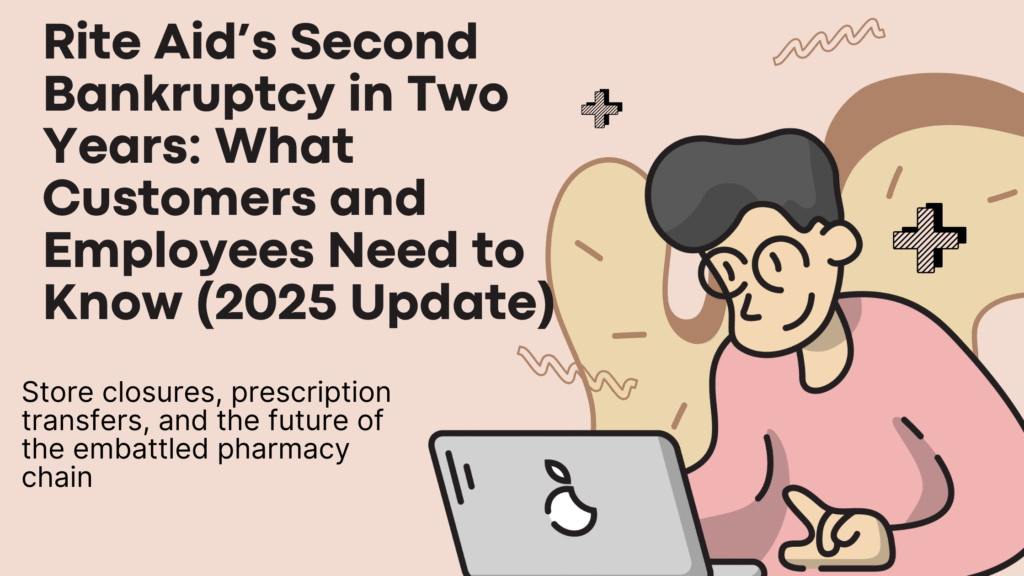
Subtitle: Store closures, prescription transfers, and the future of the embattled pharmacy chain
Introduction
Rite Aid, once a cornerstone of American pharmacies, has filed for Chapter 11 bankruptcy protection for the second time in less than two years, signaling a dramatic decline for the 60-year-old chain. With 1,245 stores across 15 states and over 24,500 employees, the fallout from this decision will ripple through communities already grappling with “pharmacy deserts” 78. Here’s a breakdown of what this means for customers, employees, and the retail pharmacy industry.
1. Why Rite Aid Filed Bankruptcy Again
- Failed Restructuring: Despite emerging from its 2023 bankruptcy with 2billionindebtrelief,RiteAidremainedburdenedby2billionindebtrelief,RiteAidremainedburdenedby2.5 billion in liabilities and could not secure sufficient vendor support or liquidity .
- Vendor Relations & Inventory Crisis: Vendors tightened payment terms, leading to empty shelves and a “vicious cycle” of declining sales .
- Industry Pressures: Competition from Walmart, Amazon, and larger chains like CVS and Walgreens—which are also closing stores—eroded Rite Aid’s market share .
2. Store Closures: What’s Next for Locations?
- Immediate Impact: While Rite Aid claims most stores will stay open during bankruptcy, 11 locations have already closed or will shutter soon, including stores in New York, Pennsylvania, and California .
- Long-Term Outlook: All stores will eventually close or be sold. The company is not restocking inventory, leading to increasingly bare shelves .
- Prescription Transfers: Rite Aid is working to transfer customer prescriptions to other pharmacies, though timelines remain unclear .
States Most Affected:
- California (347 stores)
- New York and Pennsylvania (heavy regional presence) .
3. Employee Layoffs and Corporate Downsizing
- Job Cuts: Layoffs have begun at corporate offices in Pennsylvania, with CEO Matt Schroeder citing a “dramatic downturn in the economy” and stricter lender terms .
- Employee Pay: Workers assisting with prescription transfers will continue receiving wages and benefits, but long-term job security is uncertain .
4. Customer Implications: Gift Cards, Rewards, and Prescriptions
- Gift Cards & Returns: Rite Aid will stop honoring gift cards and accepting returns/exchanges after June 5, 2025 .
- Rewards Programs: Rite Aid Rewards points stopped accruing on May 6, and existing points will expire per terms .
- Pharmacy Services: Immunizations and prescriptions remain available for now, but customers should prepare to switch pharmacies as closures accelerate .
5. The Bigger Picture: Pharmacy Industry in Crisis
Rite Aid’s struggles mirror broader challenges:
- Walgreens: Recently agreed to a 10 billion buyout by Sycamore Partners, down froma10billion buyout by Sycamore Partners,down froma100 billion valuation a decade ago .
- CVS: Closed 1,000+ stores and shifted focus to smaller pharmacy-only formats .
- Pharmacy Deserts: Store closures risk leaving vulnerable populations without access to medications, a growing concern for lawmakers .
What’s Next for Rite Aid?
- Asset Auctions: The company plans to sell pharmacy assets and inventory through court-supervised auctions in May and June 2025.
- Potential Buyers: Regional chains or retailers like Amazon could acquire select stores, but analysts doubt Rite Aid will survive as a standalone brand .
Key Takeaways
- Use Gift Cards Before June 5: Redeem balances immediately.
- Transfer Prescriptions Proactively: Contact your local Rite Aid or new pharmacy to avoid disruptions.
- Read detailed How to Navigate Pharmacy Closures in Your Community: A 2025 Guide